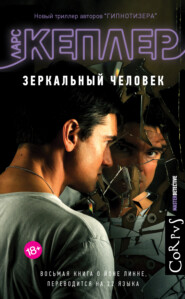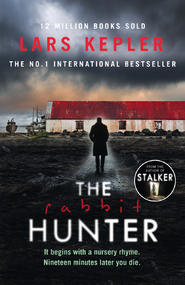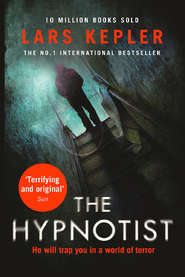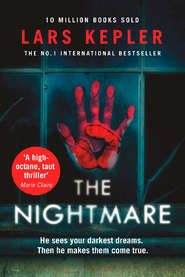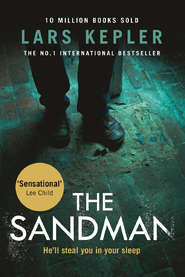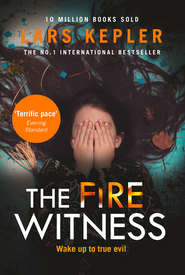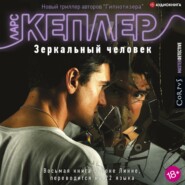По всем вопросам обращайтесь на: info@litportal.ru
(©) 2003-2025.
✖
Stalker
Настройки чтения
Размер шрифта
Высота строк
Поля
During the best of their conversations, Rocky would circle the small islands of memories in an attempt to discern a bit more.
Once he said that he and Rebecka Hansson had had intercourse in the sacristy, albeit interrupted. He could remember details, such as the rough rug they had been lying on. An old gift from the young women of the parish. She had begun to menstruate, leaving a small bloodstain, like a virgin, he said.
During the following conversations he couldn’t remember any of this.
The conclusion of the examination was that the crime had been committed under the influence of severe mental disturbance. The team believed that Rocky Kyrklund suffered from a grandiose, narcissistic personality disorder with elements of paranoia.
Erik leafs past a circled note, ‘paying for sex + drug abuse’, in the journal, followed by some ideas for medication.
Naturally he shouldn’t have had an opinion on the matter of guilt, but as time passed Erik became convinced that Rocky was guilty, and that his mental disorder constituted a serious risk of further crimes.
During one of their last sessions, Rocky was talking about a ceremony to mark the end of the school year in a church decked out with spring greenery, when he suddenly looked up at Erik and said he hadn’t murdered Rebecka Hansson.
‘I remember everything now, I’ve got an alibi for the whole of that evening,’ he said.
He wrote down the name Olivia, and an address, then gave the sheet of paper to Erik. They carried on talking, and Rocky began to speak in broken fragments, then fell completely silent, looked at Erik, and suffered a severe epileptic attack. Afterwards Rocky didn’t remember anything, he didn’t even recognise Erik, just kept whispering about wanting heroin, saying he could kill a child if only he was given thirty grams of medical diacetylmorphine in a bottle with an unbroken seal.
Erik never took Rocky’s claim of an alibi seriously. At best it was a lie; at worst Rocky could have bribed or threatened someone to support the alibi.
Erik threw away the scrap of paper, and Rocky Kyrklund was found guilty and sentenced to secure psychiatric care, with severe restrictions on any parole application.
And nine years later a woman is murdered in Bromma in a way that was reminiscent of Rebecka Hansson’s murder, Erik thinks, closing the file bearing Rocky’s name.
Aggressive violence directed at the face, neck and chest.
But, on the other hand, murders of this sort aren’t altogether unusual. They can be triggered by anything from the jealousy of an ex-husband, aggression linked to Rohypnol and anabolic steroids, so-called honour killings, or a pimp making an example of a prostitute trying to break away from him.
The only concrete connection is that Susanna Kern was left at the scene of the murder with her hand covering her ear, just like Rebecka Hansson was found on the floor with her hand round her own neck.
Perhaps Susanna Kern merely got tangled up in the belt of her kimono during the struggle.
The parallels certainly aren’t unambiguous, but they are there, and they’re forcing Erik to do something he should have done a long time ago.
He puts the file in his desk drawer and looks up the number of senior consultant Simon Casillas at Karsudden Hospital once more.
‘Casillas,’ the man answers in a voice like dried leather.
‘Erik Maria Bark from the Karolinska.’
‘Hello again.’
‘I’ve checked my diary, and I could actually squeeze in a visit.’
‘A visit?’
The sound of a squash court is audible in the background, a ball hitting the wall, the squeak of shoes.
‘I’m taking part in a research project for the Osher Centre at the Institute which involves us following up on old patients, right across the spectrum … which means I’m going to have to interview Rocky Kyrklund.’
Before they end the conversation Erik hears himself babble about the fabricated research project, about health-service funding, tax declarations, online CBT, and someone called Doctor Stünkel.
He slowly puts his phone down on the desk. Watches the little screen turn black as it slips into dormancy. The room is perfectly still. His leather seat creaks quietly like a moored boat. Through the open window he can hear the hiss of an evening shower approach across the gardens.
He bends forward and rests his elbows on the desk, leans his head on his hands and asks himself what on earth he’s doing. What did I just say? he thinks. And who the hell is Stünkel?
This could be a crazy idea, he knows that. But he also knows he has no choice. If Rocky’s alibi was genuine, then he must be released, even if that would mean a media frenzy and a miscarriage of justice.
Erik skims through the logbook. There are no notes about an alibi, but towards the end one page has been torn out. He leafs forward, then stops. From that last session with Rocky there’s a faint note in pencil that Erik doesn’t remember. In the middle of the page, it says ‘a priest with dirty clothes’ across the lines, then the remainder of the book is blank.
He stands up and goes out into the kitchen to find something to eat. While he walks through the library he repeats to himself that he has to find out if Rocky’s alibi was real.
If it was genuine, then this new murder could be connected to the old one, and Erik will have to confess everything.
19 (#ulink_da0615cb-2a9c-5851-88ba-116a0ac188c7)
Saga Bauer is driving slowly through the vast campus of the Karolinska Institute. As she approaches Retzius väg 5, she turns into the deserted car park and stops in front of the empty building.
Even though she’s tired and not wearing any make-up, hasn’t washed her hair and is wearing baggy clothes, most people would probably say she was the most beautiful person they had ever seen.
Recently there’s been something hungry and hunted about her appearance: the bright blue of her eyes makes her creamy white skin look radiant.
On the floor in front of the passenger seat is a green holdall containing underwear, a bulletproof vest and five cartridges of ammunition: .45 ACP, hollow-tipped.
Saga Bauer has been on sick leave from her job with the Security Police for more than a year, and she hasn’t visited the boxing club in all that time.
The only time she’s missed work was during Barack Obama’s visit to Stockholm. She stood at a distance and watched the President’s cortège. Being constantly on the lookout for threats is an occupational hazard. She remembers the tingle that ran through her body when she identified a potential vantage point from which to fire a rocket-propelled grenade, an unguarded window, but a moment later the danger had passed and nothing had happened.
The Forensic Medicine Department is closed, all the lights in the red-brick building seem to be off, but a white Jaguar with a damaged front bumper is parked on the path right in front of the entrance.
Saga leans to the side, opens the glove compartment, takes out the glass jar and leaves the car. The air is mild and smells of freshly mown grass. She feels her Glock 21 bouncing under her left arm, and can hear a faint sloshing sound from the jar as she walks.
Saga has to clamber across the flowerbed to get past Nils Åhlén’s car. The thorns of the wild rose make a scratching sound as they let go of her military trousers. The branches sway and a few rose petals drift to the ground.
The lock of the front door is prevented from clicking shut with the help of a rolled-up information leaflet.
She’s been here enough times before to find her way. The grit on the poorly cleaned floor crunches as she heads down the corridor towards the swing-door.
She can’t help smiling when she looks at the jar, and the cloudy liquid, the particles circling round.
The memory flashes through her, and her free hand goes involuntarily to one of the scars he left on her face, the deep cut just below her eyebrow.
Sometimes she thinks he must have seen something special in her, that that was why he spared her life, and sometimes she thinks that he simply considered death too easy – he wanted her to live with the lies he had made her believe, in the hell he had created for her.
She’ll never know.
The only thing that is certain is that he chose not to kill her, and she chose to kill him.
She thinks of the darkness and the deep snow as she walks down the empty corridor of the Forensic Medicine Department.






